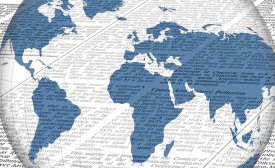journalists

CPD Advisory Board Member Katherine Brown's new book is the first to examine news media dynamics of the war in Afghanistan.

The rise of digital diplomacy was thought to lessen the importance of diplomat-journalist relationships, but recent experience indicates the contrary.
Speaking at the opening session of the international conference on threats facing freedom of expression, Dr Ali bin Smaikh al-Marri said that it was unacceptable to impose mass sanctions against civilians or journalists for any political differences. Officials from over 200 international rights groups, press syndicates, think-tanks and universities are taking part in the two-day conference at Ritz Carlton Doha.
Driven by a most relevant theme of ‘Boundaries, Identity and The Public Realm’ in these increasingly fraught times, The New York Times Art for Tomorrow Conference is set to present another fascinating round of discussions, insights, analysis, and contemplations, advanced by great minds, from March 10 to 13 at the W Doha Hotel & Residences. [...] The event will explore the tangible contributions that art and cultural development can make to economic growth and nation-building initiatives.
The NGO campaigns, led by Human Rights Watch and Amnesty International, are vital in this process. The problem is that journalists, academics, diplomats, political leaders, and Western officials frequently quote these usually uncorroborated accusations in condemning Israeli policies, “reflecting the ‘soft power’ of these NGOs acting to reinforce the Palestinian narrative and the objectives of the OIC.”







